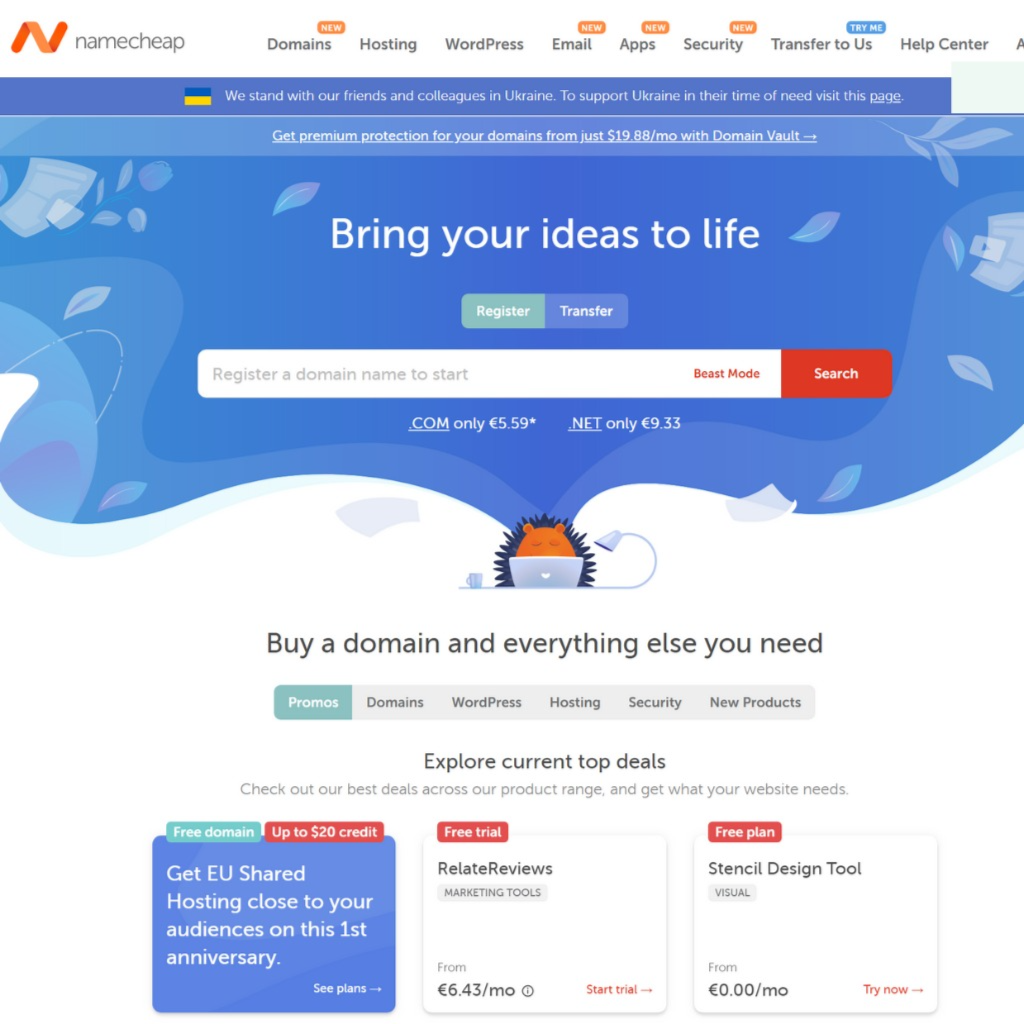Choosing a Web Host: Top Tips and Factors to Consider
Learn how to choose the best web host for your website with these expert tips. Improve your site’s reliability, security, and performance today.
Choosing a web host is an important step in creating your website. It’s important to choose the right one because this will determine how much traffic your site can handle and how quickly it loads.
The first thing you should do when choosing a web host is identify your website’s needs: Does it need to be fast and reliable? Does it require high uptime? Is security important? You should also consider what kind of budget you have available for hosting services (and other costs), as well as whether or not any special features would benefit your business model or help grow its reach on social media platforms like Facebook and Twitter
What is Web Hosting, and Why Do You Need It?

Web hosting is a crucial service that allows individuals and organizations to make their websites accessible to a global audience. It involves renting space on a server and an internet connection to store and deliver website content.
This eliminates the need to purchase an expensive server and internet connection, making it a cost-effective solution for most users. Along with cost savings, web hosting provides secure data storage, scalability, redundancy, and access to expert technicians who manage the servers. These experts diagnose and resolve any issues that may arise, ensuring reliable uptime and quick resolution of problems.
Additionally, web hosting providers offer regular data backups to protect your website in case of unforeseen events. Choosing a reliable web hosting provider ensures your website is always accessible to your audience and protected from potential threats.
Web hosting service is vital for businesses

Web hosting is an essential part of any online business. It is the foundation on which a website is built, allowing firms to share product and service information with customers, partners, and other stakeholders.
Web hosting will enable companies to make their websites available on the internet 24/7, making them accessible to anyone around the world. Additionally, web hosting helps ensure that a business’s website is securely stored and remains running even during times of high demand or large spikes in traffic.
This allows companies to avoid lost sales due to websites that are down for long periods or unable to process orders quickly enough during busy times. Furthermore, web hosting facilitates communication between businesses and their customers by allowing them to easily create contact forms, interactive web pages, shopping carts, and more.
Lastly, managed web hosting services can save businesses money by giving them support options like security monitoring and technical help from experts.
Choosing the right web host is essential
Choosing the right web host for your website is critical because it will affect its speed, performance, and security. A good web host will help ensure that your site loads quickly and reliably, has plenty of storage space, and has features like automatic backups.

Additionally, a reliable web host can provide the necessary support if something were to go wrong. Security is another essential thing to consider when choosing a web host because your data could be attacked or stolen if there are any holes in the security. To keep your website safe, it can be beneficial to find a reliable web host with strong security measures.
Shared vs. Dedicated Hosting
- Shared Hosting: This is the most common type of hosting and is usually the least expensive. With shared hosting, you share resources with other websites on a server. This means that your website will be sharing resources with other websites, so if someone else on the same server has a lot of traffic or uses up a lot of CPU power (the processing power needed to run their site), it can affect your site as well. It also means that if one person’s site gets hacked, it could compromise all the sites on that particular server because they share an IP address (Internet Protocol address).
- VPS (Virtual Private Server) Hosting: VPS is like having your own dedicated machine but without paying for dedicated hardware; instead, you’re renting out space from another company that owns physical servers and using them as virtual machines instead–you get more control over what goes into those machines than if multiple customers were using them at once!
Cloud Hosting

Experience the power of cloud hosting with Cloudways!
Cloud hosting is a term used to describe the hosting of applications that third-party providers maintain. It offers many benefits over traditional dedicated server solutions, including:
- Scalability – You can add more resources without purchasing new hardware or software licenses.
- Cost – You only pay for what you use, which makes it ideal for startups looking for flexibility and cost savings in their budget.
- Security – Cloud providers offer high levels of security because they have multiple layers of protection against threats such as malware attacks or DDoS attacks (Distributed Denial of Service). They also provide regular backups so that if something goes wrong with your site’s data or files, it will be restored quickly without affecting visitors’ access to your site.
- Performance – With cloud hosting companies like Amazon Web Services (AWS), Google Cloud Platform (GCP), Microsoft Azure, etc., there’s no need to worry about performance issues like slow load times due to insufficient bandwidth speeds; these problems are handled automatically by these providers’ networks without affecting users’ experience negatively.
- Maintenance – Hosting companies take care of all maintenance tasks related to keeping their servers running smoothly 24/7, 365 days per year, which means less work is required from the clients themselves
VPS Hosting
- Cost: VPS hosting is more expensive than shared hosting but much cheaper than dedicated servers.
- Performance: The performance of a VPS depends on its resources and how the host allocates them. You should look for hosts who use SSDs and offer fast processors with ample RAM.
- Security: As with any web hosting, you want to protect your site against malicious attacks and other threats, such as DDoS attacks (distributed denial-of-service). Check out our guide on choosing a secure host here!
WordPress Hosting

- Cost
- Performance
- Security
- Maintenance and flexibility
Choosing the Right Web Hosting Provider
Choosing the right web hosting provider can be daunting, but it’s important to do research and compare different providers before making a decision. Here are some tips for choosing the best one:
- Research and compare different providers. Look at user reviews, check uptime guarantees, and understand the terms of service.
- Read user reviews online to see what others have said about their experiences with each company; this will give you an idea of whether they were satisfied with their services. You can also read through forums where people discuss hosts in general to get an idea of each company’s reputation within its niche market (for example, WordPress hosting Drupal).
Factors to Consider When Choosing a Web Host

The most crucial factor is the reliability of the host. You must ensure that your website will remain online even during high-traffic times. Choose a web host offering guaranteed uptime and reliable customer service if something goes wrong. In addition to reliability, you should also assess the features provided by the host.
Look for features like shared hosting, dedicated servers, and any additional tools needed to make managing a website more accessible. Features like registering a domain name, using web design services, creating databases, and having email accounts can all be helpful when making a good website.
Choosing a web host that can give you everything you need and has a good reputation for being reliable and safe is essential. When picking a web host, consider how much bandwidth or storage space you will need for your website.
Different packages come with different amounts of bandwidth or storage space, so make sure you have enough for all your needs now and in the future. If your site requires more than the package offers, it might be time to look elsewhere.
What should I look for in a web host?
- Storage: How much storage space do you need? If you’re starting out, a shared plan will be fine. But if your site grows to the point where it needs more than that, then it’s time for an upgrade.
- Bandwidth: This refers to how much data can be transferred from one place to another over time- how fast your website loads! You want this number as high as possible so visitors don’t get frustrated waiting for pages and images to load up on their screens.
- Uptime: Uptime refers to how often a host is down (or unavailable), which no webmaster wants happening with their site! The best way around this problem is the uptime guarantee of the host. This will give you peace of mind because you’ll know that even if there are problems with their servers or network connection, they’ll still be working hard behind the scenes to ensure everything runs smoothly 24 hours a day, 7 days a week.
- Speed: Web hosting providers offer various plans with different performance levels depending on what kind of service level agreement (SLA) they offer – some may only guarantee 99% uptime. In comparison, others might go all out by promising 100%.
- Price: The cost of your website should be a consideration, but it shouldn’t be the only one. Before deciding on the price, you’ll want to ensure you get what you pay for regarding features and service.
Do I need a domain name?

A domain name is the web address of your site. It’s like the street address of your house, except that it’s all made up of letters and numbers instead of words. For example, if you wanted to visit my website (gearuptofit.com), “gearuptofit” would be my domain name.
Domain names can be purchased through a registrar like GoDaddy or Namecheap; the process is similar to buying online at Amazon or eBay: enter your desired URL into their search box, pay for it with a credit card, and wait for them to send you an email confirming everything went through!

Find your perfect domain today with Namecheap!
Tips for Choosing the Best Web Hosting Service
Choosing the right web host is a critical step in building your website. You’ll want to research web hosting providers, read customer reviews, and compare features and prices before choosing one. Here are some tips to help you find the best hosting plan for your needs:
- Choose the right hosting plan. If you’re starting out, it’s best to go with shared hosting as it’s affordable and easy to manage. As your site grows, consider upgrading to VPS or cloud-based solutions to scale up as needed without worrying about server capacity issues.
- Research Web Hosting Providers: The first thing you should do is research your options. You can find out which companies offer the best service by looking at their websites or reading reviews on popular sites like Trustpilot or Capterra.
- Read Customer Reviews Before Choosing a Web Hosting Provider: If you’re not sure which company offers the best service, look for those with lots of positive reviews from past customers–this will help ensure that they’re reliable and trustworthy enough to meet your needs as a business owner (or blogger).
- Look for discounts and promotions when signing up with a new provider–you may get an introductory rate on one of their more expensive plans if it’s been a while since they last offered one!
- Read customer reviews before you know what people think about each company so that when things go wrong (and they sometimes do), there won’t be any surprises!
How to Set Up a Web Hosting Account
Choose a web hosting plan that suits your needs and budget. You can start with as little as $4 per month for basic hosting, but if you need more storage or bandwidth, it’s worth paying for those extra features.
Hosting plans come in different sizes: shared, VPS (virtual private server), dedicated server, or cloud hosting. Anyone who visits a website can access it because shared hosting enables multiple websites to share the same server resources.
With VPS and dedicated servers, each site has its own space on the hardware, so if one site gets too much traffic or causes problems with other sites on the same machine (like slowing down their load times), it won’t affect others using the same server hardware at all! Cloud-based platforms are similar, except they don’t use physical hardware but run everything through software running on thousands of different computers across multiple locations worldwide; this makes them incredibly fast because there’s no distance between your computer and data stored elsewhere!
How to Install Software on a Web Hosting Account

If you have a website hosting account, you can install software on it. There are several ways to do this:
- Upload files
- Install scripts (for example, PHP or Ruby)
- Install a content management system (CMS)
Common Issues with Web Hosting
- Downtime: If your website is down, you can make money. It’s that simple!
- Slow loading times: You may have heard the saying, “The first impression is the last impression,” and it’s true for websites as well. If your site takes too long to load or doesn’t load, visitors will leave without ever seeing what you have to offer them.
- Security vulnerabilities: This one should be obvious–you don’t want hackers getting into your system and messing with things! Your host should offer reliable security measures like firewalls, antivirus software, and 24/7 monitoring of their servers by IT professionals who know what they’re doing (and how much damage can be done if something goes wrong).
- Compatibility issues: Many hosts use different types of servers for hosting websites; some are better than others, depending on what kind of site needs hosting (WordPress vs. Joomla vs. Drupal). Some hosts specialize in certain sites only, so make sure yours fits within their scope before signing up with them!
Security and Backup Solutions
When it comes to security and backup solutions, look for a web host that offers the following:
- Security features such as intrusion detection, firewall protection, and malware scanning.
- Backup solutions such as automatic nightly backups with offsite storage.
- Disaster recovery plans in case of server failure or natural disaster (such as floods or fires).
Also, consider the provider’s data privacy policies; this will help you determine whether you can trust them with your personal information.
Evaluating Web Hosting Providers

When choosing a web hosting company, several essential things must be considered. You will need to evaluate the company’s support and customer service levels!
To help you do this, we will provide some tips that include evaluating the company’s levels of support.
Most of the time, hosting services that cost more have more resources they can use to help your website. These resources include technical support, sales promotion, and general marketing.
So, when looking at the price point of an affordable provider, you should be conscious that you are spending more money on fewer resources. This is why it is essential to do some research into low-cost web hosting providers.
Comparing Web Hosting Plans
There are several things you should look at when comparing web hosting plans. These include the amount of space a host gives you to operate and manage your website, the price per website, how quickly a host responds to customer questions, and the overall quality of their services.
While not covered in specifics during this article, it is essential to know what websites you will have on your host, as they can become a source of stress if they are not up-to-date with technology or have been discontinued.
Some things must be changed, whether you are new to the web or have been around for awhile. For example, if your old hosting did not allow email accounts, it is time to update that! Or if your old service did not have unlimited bandwidth, it is time to increase that!
As these changes become more common and current technology changes, so does their price. When looking at these factors closely, you will find the best value for your needs.
FAQs
What factors should I consider when choosing a web host?
Consider factors like uptime, performance, security, support, scalability, and pricing.
How do I determine the right hosting plan for my website?
Assess your website’s needs, such as traffic volume, resource requirements, and budget.
What is the importance of server uptime?
Server uptime is crucial as it ensures your website is accessible to visitors without interruptions.
How can I ensure the security of my website with a web host?
Look for hosts that provide robust security measures like SSL certificates, firewalls, and regular backups.
Can I easily switch web hosts in the future if needed?
Yes, you can switch web hosts, but it’s important to consider migration assistance and potential downtime.
Conclusion

Choosing a web host can be hard for anyone who wants to start a website, but the process can be made easier with careful thought and research. First, consider what kind of website you want to make and how many people you think will visit it. Make sure to consider the level of customer support, technical assistance, and uptime guarantee. Lastly, compare prices and payment plans, and choose a web host that fits within your budget without sacrificing the features you need. With these things in mind, you can make a smart decision and choose a web host to help your website grow and work well.
References
- Hostinger provides a comprehensive guide on how to choose a web hosting provider. The article covers topics like understanding your website needs, researching and comparing different hosting providers, checking web host technology and features, finding dedicated support, and selecting the right web hosting plan. [1]
- Geekflare offers tips on selecting the best web host for a website, which can provide reliability, security, and performance to improve user experience, multiply traffic, and increase revenue. [2]
- Nexcess offers insights into the basics of web hosting, including the different types of hosting, various packages available, and specific options that work better depending on the user’s needs. The article also recommends checking out reviews of hosts that one is interested in. [3]
- HostingAdvice.com provides a detailed overview of high-end hosting, which includes luxury features such as automatic migrations and backups, dedicated IP addresses, and a choice of operating system. [4]
- Hostscore.net offers valuable insights into the factors to consider when choosing a web host, including performance, security, reliability, customer support, scalability, pricing, and user reviews. [5]
- Cuelogic.com provides a list of factors to consider when choosing a web host, such as uptime guarantees, backup options, technical support, scalability, security, and pricing. [6]
- Redswitches.com outlines a five-step process for choosing a web host, starting with understanding different web server types and ending with selecting a web hosting plan. The article covers shared servers, virtual private servers (VPS), and dedicated servers. [7]
- Tom’s Guide offers insights into choosing one of the best web hosting services, including factors like uptime, customer support, security, pricing, and user reviews. [8]
- Forbes outlines seven factors to consider when choosing a reliable web hosting company: server reliability, uptime scores, security, customer support, backup options, scalability, and pricing. [9]
- Fleximize.com provides insights into the different types of website hosting available and how to choose a web host provider for an SME. The article covers reliability, speed, RAM, solid-state drives, and scalability. [10]
I’m Alexios Papaioannou, an experienced affiliate marketer and content creator. With a decade of expertise, I excel in crafting engaging blog posts to boost your brand. My love for running fuels my creativity. Let’s create exceptional content together!







